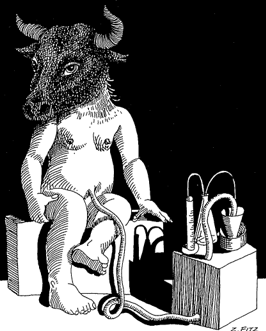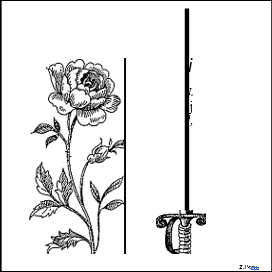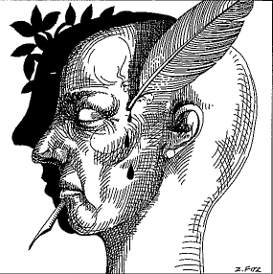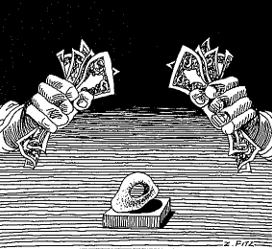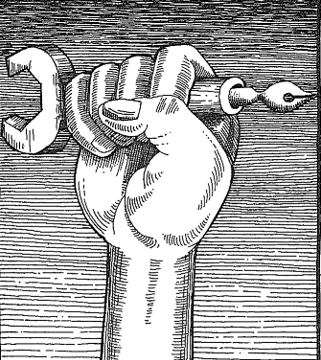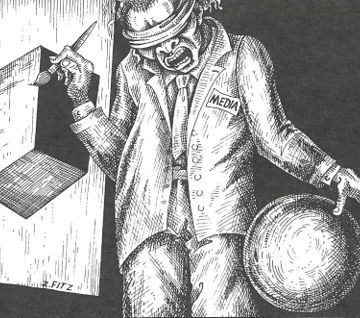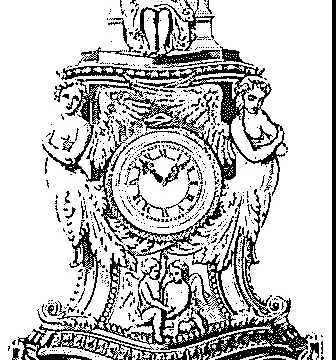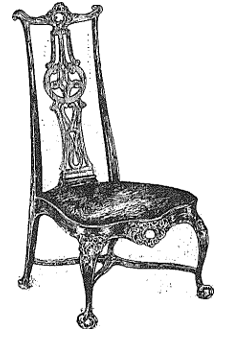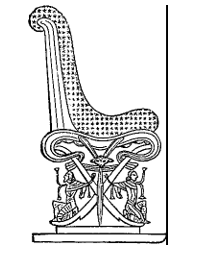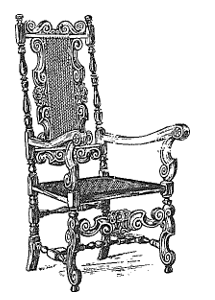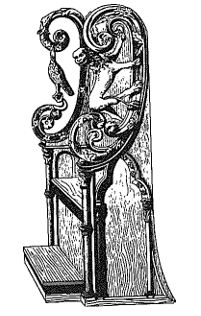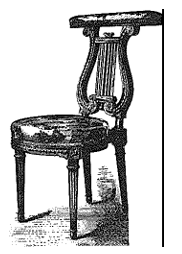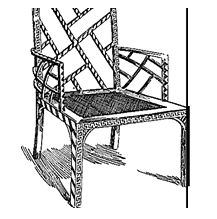‘Believing where we cannot prove.” -Tennyson Edith Efron: The Apocalyptics: Cancer and the Big Lie: How Environmental Politics Controls What We Know About Cancer; Simon & Schuster; New York. “Edith Efron would like to shake the cancer-fighting agencies to their foundations with this book, and perhaps she will.” The New Republic. ...
Category: Imported
Stranded by the Time Machine
“I don’t know whether it’s a good thing to run after our grandchildren and descendants.” -Dobrica Cosic H. G. Wells: Experiment in Autobiography; Little, Brown; Boston. H. G. Wells in Love; Edited by G.P. Wells; Little, Brown; Boston. Anthony West: H. G. Wells, Aspects of a Life; Random House; New York....
Attacking Conservative Backing
The selection of William Bennett as the new Secretary of Education came as no surprise in Washington. During his three years as chairman of the National Endowment for the Humanities, Bennett maintained a firm grasp on the fundamentals of bureaucratic life. Originally the choice of the Administration’s neoconservative supporters, he has gradually gained the grudging...
Men of Parts
That most aristocratic of literary roles, the career as man of letters, has proved especially congenial to the Southern intellectual in the 20th century. The title of one of these two volumes—A Southern Renascence Man—describes the role: the writer as a Renaissance man, a man of parts, a complete personality grounded in and developed out...
Leopold Tyrmand, 1920-1985
I am honored by the invitation to reflect with you on the life of our friend and colleague Leopold Tyrmand. There are those here who knew Leopold longer and better than I. But in the last several years I came to know him well enough that I am not surprised by the remark of one...
A Prudent Progressive
The longer I watch it at work, the more it seems to me that feminism, as we know it, is into the business of destinies. Destiny is an awesome and enigmatic notion, open to bottomless speculations. Before the recent feminist upsurge, a woman had to fulfill her destiny as a woman, an often utterly ungrateful...
Interview
CC: One of the really wholesome things about your research is the fact that you are looking at the community rather than the political system for solutions to the problem of urban crime. PJL: Lynn Curtis refers to this as an above-level philosophy, as opposed to the traditional public policy in this area, which has...
Typefaces
A class struggle is going on in the U.S. today, a confrontation between an intellectualized elite and what used to be called the democracy. The upper classes go to good schools—Ivy League or at least Big 10—where they pick up easy answers to the meaning of “life, the universe, and everything,” while members of the...
Television
Events in India of nearly 40 years ago are in the news all at once. The television series, The Jewel in the Crown, has touched the public’s nerve—not necessarily the raw nerve. The reaction has been so strong that the chemistry of success deserves close scrutiny. The exploitation of India’s resources is an old story....
Progressive Pilgrim
One week after the 1984 Presidential election, while Ronald Reagan was still basking in the afterglow of a victory he takes as evidence that “America is feeling good about itself again,” the National Conference of Catholic Bishops meeting in Washington finally got a look at the 136-page draft of a “Pastoral Letter on Catholic Social...
…Who Help Themselves
We take too much for granted in America. Whenever we have a problem, we assume that somebody else is paid to solve it, somebody from the government. All the ancient burdens of the human flesh—poverty and envy, greed and arrogance—have been turned over to one or another bureaucratic agency. We sleep better at night knowing...
Letter From North Carolina
One morning recently, National Public Radio offered its listeners an interview with a Texas mass murderer to go with their cornflakes. This monster, who had confessed to 250 or so murders, told the reporter that some of them were “sacrifices to Satan.” Aghast, the reporter asked, “You don’t really believe in Satan, do you?” (He...
A National Health Insurance for Artists
The Reagan Administrationhas been widely accused of hostility to the life of the mind. Cutbacks at the National Endowments constitute, so we are told, an attack on the arts and humanities and reflect the philistine temperament of the President’s supporters, that unnatural coalition of country club Republicans and Moral Majoritarians. Maybe so. On the other...
Music
Jazz is biding its time. It is in a period of consolidation and reflection that began as the 1970’s wound down. 1t may be that the search for roots and basic values presaged, as movements in jazz often have, a change in the society at large. The Reagan years were not far off. The jazz...
Evolution: A Mistake on Its Own Terms
Though the opponents of Darwinism technically won the famed Scopes Trial of 1925, that event is generally regarded as a decisive triumph for the theory of evolution. After Clarence Darrow had exposed the educational and philosophical deficiencies of the Tennessee anti-Darwinians to a national audience, never again would it be intellectually respectable in America to...
Mr. Kennan’s Recollection
Mr. George Kennanonce again displays his unique brand of fausse naivete in a recollection published in The New Yorker. Here is how he registers his shock of recognition activated by a stylish and moody encounter between William C. Bullitt, the first U.S. Ambassador to the U.S.S.R., and Maxim Litvinov, the Soviet Commissar for Foreign Affairs,...
Teenage Suicide
Young Americans are killing themselvesat an unprecedented rate: teenage suicide is up fivefold in the last 20 years. The national response to this calamity has been curiously muted. There is a strange reluctance to link this epidemic with the massive changes in family life of the past two decades. There is, for example, a suggestive...
Supply-Side Mercantilism
It is hard to believe that only a few years ago, political economy was dominated by talk of zero-sum societies and the limits to growth. Today, the talk is all of job-creation, reindustrialization, and high-techinvestment. This reversal in outlook is one of the clearest indicators of the ascendency of right-wing themes in American politics. The...
Commendables – Mother of Her Country
Pauline Glen Winslow: I, Martha Adams; St. Martin; New York. Something strange is brewing in the popular arts these days. Red Dawn reminded its very large audiences of the possible menace of a Soviet invasion, and every week producer Stephen J. Cannell entertains millions of Ameri can viewers with the exploits of heroic Vietnam veterans...
Fuzzy Focus & Clear Vision
Every now and again a book appears which, despite its pervasive deficiencies, is destined to become a minor classic simply because it epitomizes the delusions of an epoch. Such, for example, were the bogus Sir John Mandeville’s Travels, a compendium of medieval credulity about men who walked on their heads or had eyes in their...
Waste of Money – Liberal Neuroses
John S. Saloma III: Ominous Politics: The New Conservative Labyrinth; Hill and Wang; New York. Because Goliath laughed when David came against him with a sling shot and five smooth stones, we may safely assume that the giant was neither a leftist nor a liberal. For as Ominous Politics by John S. Saloma III makes...
Partial Prognoses
Paul Fussell has written an interesting entertainment that examines the American class structure. It is basically descriptive and impressionistic and espouses no cause. It is filled with keen insights and amusing anecdotes and is consequently a relaxing, nontaxing book. In essence, it meshes with a vast Western literature—both scholarly and pedestrian—that enthrones class as the...
A Prudent Progressive
Do people still rely on the credibility of Prince Bakunin? If they do, this surely must attest to the incurability of the Western civilization’s decline, to its perennial susceptibility to decay through murky and invincible diseases of perception and intelligence. It somehow makes us incline toward a Darwinian concept of justice: a civilization that has...
Lightness & Lard
Perhaps it was in retaliation for those fried potatoes that are served up in little bags and cartons at McDonald’s that they did it, that they performed an act which is so horribly outlandish. The French, those in question, have always been a very proud people; nowadays, the word French in English seems to be...
The Media as Fun-House Mirror
The publication of Russ Braley’s Bad News represents a landmark moment in the history of current affairs. No longer will it be possible for some enthusiastic and devoted reader of the New York Times to argue his position without recognizing the extent to which this newspaper has systematically colored the major events of this century....
Art: Balthus
Balthus: A Retrospective, an exhibition representing a half century (1930-1980) of the contemporary French artist Balthus (Balthazar Klossowski of Rola), closed in May at New York’s Metropolitan Museum of Art. It consisted of some 50 paintings and 60 drawings. Included in the show were illustrations for Emily Brontë’s Wuthering Heights (1933), in which Balthus identified...
Journalism
These are conflicting notions: warm feelings, no matter from which spiritual or emotional fount they emanate, must end in a bit of unfairness. The only human construct that firmly believes in and widely proclaims its ability to be exempted from this rule is, of course, the New York Times. For many years, the Times succeeded...
Wonder Woman?
Gloria Steinem tells a number of revealing anecdotes in this collection of essays. In one piece she describes how she and George McGovern drove to John Kenneth Galbraith’s home for a weekend of heavy political strategizing. After the weekend talks, during which Steinem was greatly impressed with McGovern’s brilliance, they got in the car and...
Polynesian Postcards from Dr. Freud
A number of people in the movie reviewing business are busy commenting on whether the team of Anthony Hopkins and Mel Gibson in 1984 measures up to Charles Laughton and Clark Gable in 1935 and/or Trevor Howard and Marlon Brando in 1962. This smacks of handicapping midget tag-team wrestling matches, so let’s ignore that whole...
Comment
If familiarity were the same thing as understanding, it would be supererogatory to raise the question of what the media mean. Nothing is more generally familiar in our time, nothing deals more consistently with the familiar, and nothing familiarizes masses of men more rapidly with certain classes of events. Surely it should be enough for...
Remembrance of Trivia Past
Surely the most significant text a man ever starts out to interpret is the compromise that is his own life. The events, ragged and serene, that tempt explanation were shared by others, and so it is with delicacy and humility that the autobiographer should seek to set the record straight—yet all too frequently the public...
Historical Portraiture
Or the many reasons for reading about the past, perhaps the most natural and common one is curiosity and the love of a good story. Although it probably is the least philosophical approach, there always will be a place for the sliceof-life history because a well-written depiction of life in an ancient polis, a single...
The Surley Skies & Other Civil Slights
What kinds of behavior does our culture encourage? The question is ever in style, and usually a pat and misleading answer is on the tongue of every commentator. Greed, bellicosity, phoniness, racism, sexism, and speciesism come immediately to their minds. However, the question inevitably is worthy of a more meaningful analysis. Our culture has accomplished...
Ideologues in Search of a Faith
Most contemporary intellectuals reject Hilaire Belloc’s claim that the West must return to Christianity if it is to survive as a civilization. In their view, we live in an enlightened and disenchanted world that has left behind forever the integral but innocent and uncritical Age of Faith. And as if to lend support to their...
Correspondence
Letter from Brazil: The Consuming Crisis Returning to Brazil for five months as a Senior Fulbright Lecturer after an absence of seven years, I expected to see considerable change. Things happen rapidly in such a developing nation. And indeed Brazil today presents striking contrasts to the Brazil I knew for two years in the mid-1970’s....
Music
Technical Problems One facet of music that’s often unacknowledged is that technology has a large effect on it, not merely on the creation of music (i.e., through the development of new or somehow modified instruments), but on it’s reception. For example, in 1948 John Bardeen, William Shockley, and Walter Brattain invented the transistor. By the...
“Social Register”
With a sense of sweet justice muted only by the most basic human considerations, we read of one event in New York’s end-of-summer season: the mugging of two prominent socialites, big stars on the Manhattan lib jet-set firmament, both shining lights of Vogue and WWD. The deliciously exciting romp took place in the East End-Carl...
Jorge Luis Borges
Jorge Luis Borges is anything but easy to accept, absorb, comprehend, and emotionally embrace. It’s not that his poems, short stories, and essays are all hard to read, for some of them have the lucidity and pure tone of a crystal form seen and struck. Others are admittedly trying, especially for those not cognizant of...
A Dubious Discourse
In 1963 Roland Barthes recommended: “watch who uses signifier and signified, synchrony and diachrony, and you will know whether the structuralist vision is constituted.” When Barthes put that remark into an essay entitled “The Structuralist Activity,” he was at the peak of his career as a structuralist. Yet, as is clear from that suggestion, as...
James Burnham
Few 20th-century writers have moved so dramatically from the left to the right as James Burnham, and fewer still have articulated so clearly the moral and cultural validity of such a shift. Born in Chicago in 1905 and educated at Princeton and Balliol, Burnham began a 26-year career as a teacher and professor of philosophy...
Getting & Spending
One of the oddest intellectual trends of recent years has been the abandonment of economic determinism by writers on the left and its adoption by some writers on the right. The notion that all important human affairs are controlled by economic relations is a key element of Marx’s theories, yet the most influential leftist writers...
Writing Poetry & Striking Poses
”When he wriggles,” Ambrose Bierce once wrote of the politician, “he mistakes the agitation of his tail for the trembling of the edifice.” Bierce might well have said the same about modem writers who cannot distinguish between propaganda and art or between political sermons and poetry. Within the last year college bulletin boards and newspapers...
Dark Contract
Matthew Bruccoli is, perhaps, the leading biographer of modern American novelists. With this book he scores something of a triple, as it appeared soon after his acclaimed lives of Fitzgerald and O’Hara. Like his other works, it is exceptionally well-produced. It is a handsome book, with a full apparatus of notes and documents. There is...
A Flounder and the Shark
Vladimir Bukovsky remarked that without a guide through the “labyrinths of the Soviet soul,” studies of socialism “are simply useless—or worse, they make the subject even more obscure. “ Were it not for the fact that Adam Ulam has been interpreting the Soviet Union since long before Bukovsky made his comment, one could suspect that...
A Man Among Mice
Lady Lytton probably summed up the aura of Winston Churchill most effectively when she said, “The first time you meet Winston you see all his faults and the rest of your life you spend in discovering his virtues.” Those who have chronicled Churchill’s life have been liberal about providing a compendium of his faults. Churchill...
Open—Or Empty?
In the work of Professor Germino’s prime mentor, Eric Voegelin, and that of Hannah Arendt, the subject of Professor Young-Bruehl’s biography, we have the head and the heart of a theory of man that understands politics as phenomenality, as self-disclosure in a space of appearances, originating in the “experiential locus of humanity.” This locus is...
Twinkle, Twinkle
These three works deal with aspects of what will be a crucial problem of the next generation: the exploitation of space travel and its effect on the arms race. Daniel Graham’s High Frontier advocates convincingly an all-out space effort for both military and economic purposes. James Canan’s book is a straight reportorial account of the...
One Way Out
So too it may be useful to write a novel about the end of the world. Perhaps it is only through the conjuring up of catastrophe, the destruction of all Exxon signs, and the sprouting of vines in the church pews, that the novelist can make vicarious use of catastrophe in order that he...
Faltering Christian Soldiers
Eerdmans justly enjoys a reputation as one of America’s leading Christian publishers; however, as modern Christianity itself becomes increasingly fragmented and secularized, publishing books that try to represent the whole of it, as these two volumes do, becomes increasingly problematic. Though the United States has never been united by a single communion or creed, until...
At the Abyss
Although a world safe from nuclear destruction is an ideal that all civilized people should pray for, as a practical matter, it is an impossibility. Nuclear weapons exist and will continue to do so until the time that (a) they have been used and so only rubble remains or (b) they have been replaced by...
